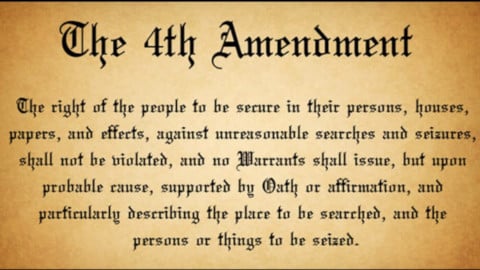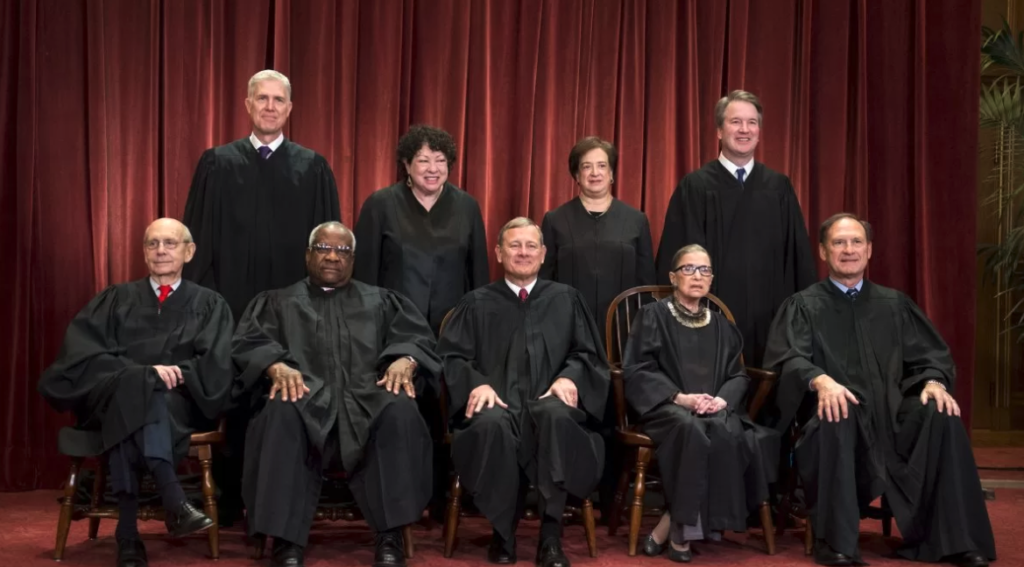The Fourth Amendment to the United States Constitution

The Fourth Amendment to the United States Constitution was written by James Madison and became part of the United States Constitution 1791. The first part of the amendment states:
The right of the people to be secure in their persons, houses, papers, and effects, against unreasonable searches and seizures, shall not be violated…
Though these words were written before automobiles even existed, the amendment applies when a law enforcement officer conducts a traffic stop of a motor vehicle.
Police Investigatory Stops
A federal law enforcement officer may detain a person temporarily if the officer has a reasonable suspicion that a person has committed, is committing, or is about to commit a crime. This type of police-citizen encounter is called an investigatory stop.
In order not to violate a citizen’s constitutional right against an unreasonable seizure, an investigatory stop requires the officer to have a well-founded, articulable suspicion of criminal activity. Articulable means the officer can list reasons for his suspicion. Mere suspicion is not enough to support a stop.
What is a Motion to Suppress?
A motion to suppress evidence is a request by a defendant’s lawyer that the judge exclude a particular piece of evidence at a trial. Motions to suppress are normally made before trial, and if a federal judge grants a motion to suppress it may lead to the dismissal of a federal criminal case.
For example, let’s say a DEA (Drug Enforcement Administration) task force officer pulls a car over for driving 45-mph in what the task force agent believes is a 35-mph zone (by way of explanation, a DEA task force officer is a local law enforcement officer that has been authorized to enforce federal law).
If during the traffic stop the DEA task force officer sees several kilogram sized bricks of cocaine in the back seat of the car, the agent will arrest the driver for federal drug trafficking. However, if it turns out that the speed limit where the driver was stopped was actually 45-mph and not 35-mph, then the driver’s attorney would likely file a motion to suppress evidence because the DEA task force agent had no legal reason to stop the driver as the driver was not speeding.
Under these facts, a federal judge would likely grant the motion to suppress, and the prosecutor would not be permitted to use any of the evidence that the officer obtained as a result of the unlawful stop of the vehicle. With no evidence of cocaine, the prosecutor would be forced to drop the case, or the federal judge would simply dismiss the case.
The facts of the Supreme Court Case Kansas v. Glover?
While on routine morning patrol around Lawrence, Kansas, a sheriff’s deputy saw a pickup truck and decided to run a check on the registration. The deputy had not witnessed any traffic violations.
The sheriff’s department database showed that the truck belonged to Mr. Charles Glover, and that Mr. Glover’s license had been revoked. The deputy did not see who was driving but he assumed it was the registered owner – Mr. Glover. When the deputy stopped the truck, he discovered that Mr. Glover was in fact driving. The State of Kansas eventually charged Mr. Glover with driving on a suspended license.
Mr. Glover’s attorney filed a motion to suppress all the evidence arising out of the traffic stop on the ground that the traffic stop violated the U.S. Constitution’s Fourth Amendment’s prohibition against unreasonable seizures because the deputy lacked reasonable suspicion that a crime had been committed. The trial judge agreed with Mr. Glover’s attorney and granted the motion, but the prosecutor appealed, and the case eventually made its way up to the United States Supreme Court.
What did the U.S. Supreme Court Decide in Kansas v. Glover?

The U.S. Supreme Court reviewed Mr. Glover’s case, and rule against him. The Supreme Court held that judges must allow officers to make “commonsense judgments and inferences about human behavior.”
Specifically, the Supreme Court held that when a police officer runs a vehicle’s license plate and learns that the registered owner’s driver’s license has been suspended, and the officer does not have any information that contradicts the logical conclusion that the owner of a vehicle is most likely the person driving the vehicle, that the officer may perform a traffic stop of the vehicle to investigate who is driving.
Kansas v. Glover’s Impact on Search and Seizure in Tampa Federal Criminal Cases
Federal district court judges in Tampa follow the Supreme Court’s interpretation of the Fourth Amendment.
Therefore, if a Tampa federal law enforcement officer runs a vehicle’s license plate and learns that the registered owner’s driver’s license has been suspended, the officer may perform a traffic stop of the vehicle to investigate who is driving. However, as explained by the U.S. Supreme Court in Mr. Glover’s case, the officer must not have had any information contradicting the logical conclusion that the owner of the vehicle was the person driving the car. For example, if the officer was sitting at a red light and looked over and saw a 20-year-old woman driving a vehicle, but then the officer learned that vehicle was owned by a 70-year-old man that had a suspended driver’s license, the officer would not be justified in stopping the vehicle based upon the 70-year old’s suspended license.
Posted in Criminal Procedure, Federal Criminal Defense
